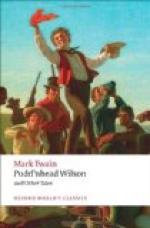Rowena thought Luigi’s retort was wonderfully quick and bright, and she remarked to herself with satisfaction that there wasn’t any young native of Dawson’s Landing that could have risen to the occasion like that. Luigi detected the applause in her face, and expressed his pleasure and his thanks with his eyes; and so eloquently withal, that the girl was proud and pleased, and hung out the delicate sign of it on her cheeks. Luigi went on, with animation:
“Both of us get a bath for one ticket, theater seat for one ticket, pew-rent is on the same basis, but at peep-shows we pay double.”
“We have much to’ be thankful for,” said Angelo, impressively, with a reverent light in his eye and a reminiscent tone in his voice, “we have been greatly blessed. As a rule, what one of us has lacked, the other, by the bounty of Providence, has been able to supply. My brother is hardy, I am not; he is very masculine, assertive, aggressive; I am much less so. I am subject to illness, he is never ill. I cannot abide medicines, and cannot take them, but he has no prejudice against them, and—”
“Why, goodness gracious,” interrupted the widow, “when you are sick, does he take the medicine for you?”
“Always, madam.”
“Why, I never heard such a thing in my life! I think it’s beautiful of you.”
“Oh, madam, it’s nothing, don’t mention it, it’s really nothing at all.”
“But I say it’s beautiful, and I stick to it!” cried the widow, with a speaking moisture in her eye.
“A well brother to take the medicine for his poor sick brother—I wish I had such a son,” and she glanced reproachfully at her boys. “I declare I’ll never rest till I’ve shook you by the hand,” and she scrambled out of her chair in a fever of generous enthusiasm, and made for the twins, blind with her tears, and began to shake. The boy Joe corrected her: “You’re shaking the wrong one, ma.”
This flurried her, but she made a swift change and went on shaking.
“Got the wrong one again, ma,” said the boy.
“Oh, shut up, can’t you!” said the widow, embarrassed and irritated. “Give me all your hands, I want to shake them all; for I know you are both just as good as you can be.”
It was a victorious thought, a master-stroke of diplomacy, though that never occurred to her and she cared nothing for diplomacy. She shook the four hands in turn cordially, and went back to her place in a state of high and fine exultation that made her look young and handsome.
“Indeed I owe everything to Luigi,” said Angelo, affectionately. “But for him I could not have survived our boyhood days, when we were friendless and poor—ah, so poor! We lived from hand to mouth-lived on the coarse fare of unwilling charity, and for weeks and weeks together not a morsel of food passed my lips, for its character revolted me and I could not eat it. But for Luigi I should have died. He ate for us both.”




